Mark Lawrence of Charleston on Sunday signed a “Charleston United” canvas filled with hundreds of names. It was set up on the sidewalk along Calhoun Street under the entrance to Emanuel AME Church where nine members were shot and killed in what authorities are investigating as a hate crime. The tragedy shocked the world. But unlike some communities that erupted into violence following race-based shooting, unity gripped Charleston residents as victims’ families forgave the suspect, thousands rallied in shows of community support and urgent calls to eradicate racism and hate filled newspapers and the airwaves, including renewed furor to remove the Confederate flag on the Statehouse grounds in Columbia. In this issue, are two commentaries on the evolving issue and ways you can help by donating to funds set up to help the victims and move forward with positive work that will heal. (Photo by Andy Brack.)
IN THIS ISSUE
PHOTO: Charleston is united in its mourning and concord
FOCUS: Memorial in Charleston
DONATE: Two funds to help victims’ families, good works
BRACK: Open the door of the race closet
IN THE SPOTLIGHT: Morris Financial Concepts, Inc.
GOOD NEWS: On Magnolia Gardens, poem, art prize
FEEDBACK: Letters of thanks
CALENDAR: June 22+: Citizenship ceremony, Carolina Day
REVIEW: The Moon Sisters
MYSTERY: It was the Eiffel Tower
S.C. ENCYCLOPEDIA: African Methodist Episcopal Church in South Carolina
TODAY’S FOCUS
Memorial in Charleston
By Jack Bass
Published originally by The New Yorker; republished with the permission of the author
JUNE 19, 2015 | The only time I sat in what is known in Charleston as Mother Emanuel African Methodist Episcopal Church was in the early nineteen-sixties, when Martin Luther King, Jr., delivered a sermon. I was a reporter at that time, and I remember King speaking not as a civil-rights leader but as a preacher, with call and response to his message coming back from the congregation.
A few years ago, though, I met Mother Emanuel’s pastor, the Reverend Clementa Pinckney. Interested in getting to know him, I called one day to ask if we could meet, and he offered to come to my office. We visited for almost half an hour, talking about current issues before the state legislature. Pinckney was murdered at his church on Wednesday, along with eight members of his congregation. Now I regret not recalling more of our conversation.
For eighteen years, Pinckney was also a Democratic state senator, representing parts of five rural counties. He rarely spoke on the House floor in Columbia, but when he did, his tall stature and deep baritone voice were commanding. Pinckney’s service as a state representative wasn’t unique in the A.M.E. Church. During Reconstruction, Richard Cain, one of South Carolina’s eight black congressmen, served as pastor at Emanuel, and he established many A.M.E. churches in South Carolina. Today, there are five hundred and fifteen.
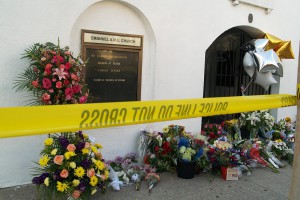 I learned about the murders at the church just before going to bed on Wednesday, when I got a late-night call from Cleveland Sellers, who was the third-ranking officer of the Student Nonviolent Coordinating Committee during the Civil Rights Era. The president of Voorhees College, a historically black institution affiliated with the Episcopal Church, and a long-time friend, he called and asked if I’d heard what had happened. My wife and I stayed glued to local TV coverage until 2 A.M., and learned that a memorial service would be held at noon the next day, at Morris Brown A.M.E. Church, about half a mile from Mother Emanuel, and a center for civil-rights activity since the nineteen-sixties.
I learned about the murders at the church just before going to bed on Wednesday, when I got a late-night call from Cleveland Sellers, who was the third-ranking officer of the Student Nonviolent Coordinating Committee during the Civil Rights Era. The president of Voorhees College, a historically black institution affiliated with the Episcopal Church, and a long-time friend, he called and asked if I’d heard what had happened. My wife and I stayed glued to local TV coverage until 2 A.M., and learned that a memorial service would be held at noon the next day, at Morris Brown A.M.E. Church, about half a mile from Mother Emanuel, and a center for civil-rights activity since the nineteen-sixties.
More than five hundred people, roughly half white and half black, filled the church, with some standing behind the back pews. Several hundred more stood outside, on the sidewalk, in the ninety-nine-degree heat. They all sang “Amazing Grace.” Charleston Mayor Joseph P. Riley, Jr., who will retire in January after forty years in office, announced that the city of Charleston had created a Mother Emanuel Hope Fund to help the families of the victims. Congressman James Clyburn, a South Carolina Democrat and the son of an evangelical minister, who was a congregant at Morris Brown decades ago, when he lived in Charleston, addressed the audience. “There is no more solid experience in this country than the black church,” he told us.
At Morris Brown, I sat next to a former colleague at the College of Charleston, who spoke about an event he had arranged this past spring, at which Pinckney spoke, at Charleston’s Hampton Park. It marked the hundred-and-fiftieth-anniversary commemoration of a ceremony in which African-American citizens of Charleston had reinterred more than two hundred Union dead previously buried in a mass grave.
Following a series of events and the singing of “America the Beautiful,” Pinckney had given a homily. He read from the nineteenth chapter of Second Samuel, in which King David mourns the death of Absalom, the son who rebelled against him. Pinckney urged the audience to not only remember the ultimate sacrifice of so many but also to honor their sacrifice, by continuing to work toward the “great task” described by Lincoln in his Gettysburg Address. “Together we come to bury racism, to bury bigotry, and to resurrect and revive love, compassion, and tenderness,” Pinckney said.
Noted historian Jack Bass, co-author of The Palmetto State and author of several award-winning histories, is a native of North, S.C., and now lives in Charleston. More: JackBass.com
DONATETwo funds set up to help families, community
The city of Charleston has established two official funds to take donations following Wednesday’s tragic shooting at Emanuel AME Church.
The Mother Emanuel Hope Fund will provide direct financial support for the funeral and burial expenses of the nine victims of the tragedy. Any money left after the expenses are paid will be donated to the church to use in ways determined by its governance board. Donations to the HOPE Fund are not tax-deductible, according to sources.
- To donate by check, send your contribution to Mother Emanuel Hope Fund, City of Charleston, P.O. Box 304, Charleston, SC 29402. Or you can stop by any Wells Fargo bank nationwide to donate. Finally, you can donate by going online here: www.Bidr.co/prayforcharleston.
The Lowcountry Ministries Pinckney Fund is an initiative by the city and Palmetto Project to fund community initiatives in areas in which one of the victims, state Sen. Clementa Pinckney, who also was pastor at Emanuel AME Church. Donations to this fund are tax-deductible. This fund is to be guided by an advisory board of Pinckney’s colleagues, friends and family along with representatives from congregations he served including Emanuel AME Church. The Palmetto Project will provide professional oversight and management of the fund.
- To donate by check, send your contribution to Lowcountry Ministries Pinckney Fund, Palmetto Project, 6296 Rivers Avenue, #100, North Charleston, SC 29406. Or you can donate online at www.PalmettoProject.org.
Open the door of the race closet
By Andy Brack, editor and publisher
JUNE 22, 2015 | Most South Carolinians don’t know a lot of out-of-the-closet, vociferous racists. They’re probably around, just like they have been since two people who didn’t look like each other first met. But in our society — here and in other states — they generally live on the fringes.
![]() A hundred years ago, racism was institutionalized in the South with Jim Crow laws and separate but equal schools. That changed after World War II as people marched to embrace civil rights. And while governments deinstitutionalized racism in accommodations, schools and meeting places, people’s attitudes took longer. The overt racism of the past became a more hidden, covert prejudice found today across the nation in persnickety comments, sharp glances, rolled-up windows at stoplights.
A hundred years ago, racism was institutionalized in the South with Jim Crow laws and separate but equal schools. That changed after World War II as people marched to embrace civil rights. And while governments deinstitutionalized racism in accommodations, schools and meeting places, people’s attitudes took longer. The overt racism of the past became a more hidden, covert prejudice found today across the nation in persnickety comments, sharp glances, rolled-up windows at stoplights.
But what I know, today, is that most people in the South get along, regardless of skin color. People might have different economic circumstances. They might go to different churches. They might live in different neighborhoods. They might have different cultural traditions. But they generally are accepting and not hung up on race. White, brown, black people attend the same schools, restaurants, football games, libraries, grocery stores, malls, beaches, airports and so on.
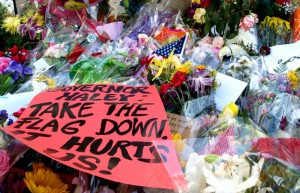 I also know that people from outside the South have a hard time believing any of this, particularly with the rebel flag flapping in the wind outside the Statehouse in Columbia. Or when they see news of a white gunman going into a place of worship and shooting nine people at a prayer meeting. Or when a white cop uses a stun gun and then a pistol on an unarmed black man stopped for a traffic violation.
I also know that people from outside the South have a hard time believing any of this, particularly with the rebel flag flapping in the wind outside the Statehouse in Columbia. Or when they see news of a white gunman going into a place of worship and shooting nine people at a prayer meeting. Or when a white cop uses a stun gun and then a pistol on an unarmed black man stopped for a traffic violation.
Folks, there is evil in the world. There’s no two ways about it. It’s in South Carolina. It’s in Oregon. Good people must do what they can to thwart it. Otherwise, we’ll have more shootings like the one in Charleston. Or Newtown. Or Littleton. Or Aurora.
There are things we can do to combat this evil. It would help, for example, if we stopped fueling hate with bitterness, acrimony, divisiveness and partisanship in our political and community talk.
 Quite frankly, America — not just South Carolina — needs to blast the closed door of race off its hinges and confront it vigorously. We need active community discussions, involvement and engagement over a long period to heal and deal with the issue. We need, as Columbia strategist Charles Weathers says, to have “courageous conversations.” Let’s target hate and racism just as we target lung cancer or some other dreaded disease — with education and resources.
Quite frankly, America — not just South Carolina — needs to blast the closed door of race off its hinges and confront it vigorously. We need active community discussions, involvement and engagement over a long period to heal and deal with the issue. We need, as Columbia strategist Charles Weathers says, to have “courageous conversations.” Let’s target hate and racism just as we target lung cancer or some other dreaded disease — with education and resources.
It also wouldn’t hurt if symbols of hate were not prominently displayed, such as the Confederate flag on the Statehouse grounds. Yes, the flag represents heritage to some. But a far greater number find it to be a symbol of hate. If you want your flag, fine. Put it on your wall. Find it in a museum. But don’t publicly display it on state-owned land.
We also could do more to control the pervasiveness of handguns. There are more than 50 million in the United States. As a state, do we really need to make it easier for people to carry concealed weapons — without a permit, as a current House bill proposes — or do we need to make it tougher? For the record, I am not suggesting that people give up the right to own handguns. What I’m suggesting is more controls — criminal background checks, mental stability checks, longer waiting periods, controls on gun shows.
I can already hear the gun lobby’s arguments: Guns don’t kill people; people kill people. But those who want guns controlled like in every other advanced country find this ludicrous. Easy access to guns makes it more likely someone who is upset or mentally ill will turn to one and use it. Just look at our state’s high rate of domestic violence. Our legislature made a good start this year to try curb guns in the hands of abusers, but it’s only a beginning.
What happened in Charleston Wednesday night does not reflect the core of South Carolina. But we’ve got to prove it by working diligently to confront hate and eradicate the roots of racism so this kind of senseless tragedy never happens again.
MORE:
- 6/21/15: Flying Confederate battle flag at half-staff requires supermajority vote, Politifact. In this story, Pulitzer Prize-winning Politifact.com turned to several sources, including Statehouse Report, to look at what’s going on with the flag at the Statehouse.
- 6/18/15: Charleston shaken by deadly church shooting, On Point with Tom Ashbrook, NPR. This hour-long radio call-in show included editor and publisher Andy Brack as a guest. You can listen to the audio through the link.
- 6/18/15: Charleston shooting causes sadness, shock, anger, frustration, CharlestonCurrents.com. In this commentary published hours after the shooting, Andy Brack looks at the impact of the shooting. The column was posted on the front page of Huffington Post for the first day after the shooting.
Andy Brack is editor and publisher of Charleston Currents and Statehouse Report. You can reach him at: editor@charlestoncurrents.com
IN THE SPOTLIGHTMorris Financial Concepts, Inc.
 The public spiritedness of our sponsors allows us to bring Charleston Currents to you at no cost to readers. Morris Financial Concepts, Inc., is a nationally recognized, fee-only financial consulting firm that helps you identify and align your resources, values and goals to achieve an enriched life. We do not accept commissions or compensation related to the products and service we recommend. Our counsel is based solely on what we believe is best for each client. Learn about founder and Charleston Currents columnist Kyra Morris and more about the consultancy at: Morris Financial Concepts, Inc.
The public spiritedness of our sponsors allows us to bring Charleston Currents to you at no cost to readers. Morris Financial Concepts, Inc., is a nationally recognized, fee-only financial consulting firm that helps you identify and align your resources, values and goals to achieve an enriched life. We do not accept commissions or compensation related to the products and service we recommend. Our counsel is based solely on what we believe is best for each client. Learn about founder and Charleston Currents columnist Kyra Morris and more about the consultancy at: Morris Financial Concepts, Inc.
Ladybugs to fly free at Magnolia Gardens
More than 150,000 ladybugs will fly free July 25 at Magnolia Plantation and Gardens during the Lowcountry’s largest release of the environmentally-friendly insect.
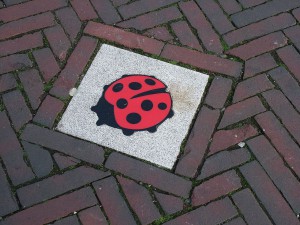
The ladybug street tile is a symbol against “senseless violence” in The Netherlands and is often placed on the sites of deadly crimes, according to Wikipedia.
A red Volkswagen beetle, resembling a gigantic ladybug, will arrive at 10 a.m. to signal the start of the ladybug release. Hundreds of children, some dressed in ladybug costumes, will scatter throughout gardens to find the perfect spot to release their share of ladybugs.
Prizes will be awarded for the best ladybug costumes. Categories will be children under two, three to six and seven and older. A face painter will attend the event. Car pooling and early arrival is encouraged. The event ends at 1 p.m.
The popular ladybug is a natural predator to harmful insects such as aphids, scale insects and other small insects.
Some of the groups that will setup nature displays include: Audubon Center at Beidler Forest; Clemson Master Gardeners; Cypress Gardens, butterfly display; Grice Marine Laboratory at the College of Charleston; Keep Charleston Beautiful, an anti-litter campaign; Keeper of the Wild, a wildlife rescue center; Native Plant Society; Reptile Innovations; and Turtle Survival Center.
A $15 adult general garden admission is required to participate. The admission for children six to 12 is $10. Children under six are free.
In other good news:
Memorial poem. S.C. Poet Laureate Marjory Wentworth, who coordinates the monthly Palmetto Poem for Charleston Currents, offered a moving tribute the victims of the Charleston church shooting in Sunday’s wrap-around memorial pages of The Post and Courier. Watch Wentworth read it for BBC.
Contemporary art finalists: The Gibbes Museum of Art and Society 1858 last week announced the names of six artists who are finalists for the 1858 Prize for Contemporary Southern Art, an annual award that has a cash prize of $10,000. More than 275 artists submitted applications. The winner will be announced September 17.
“Seeing the prize grow this year—not only in the number of applications, but also in the level of diversity and range of artistic medium—has been like a dream come true for Society 1858,” says Society 1858 President Jamieson Clair.
Finalists include:
- Aldwyth, a South Carolina artist who has worked in relative seclusion for several decades. “She creates intricate collages and assemblages, often monumental in scale, from found objects, appropriated images, text, and other elements.”
- Andrea Keys Connell, a Virginia sculpture and assistant professor at Virginia Commonwealth University who “creates figurative works that challenge conventional notions of monuments, statuary and figurines”
- Kevin Jerome Everson, a Virginia filmmaker whose work uses scripted and documentary footage to examine the everyday lives of working class African Americans and other people of African descent.
- George Jenne, a video artist who lives in Chapel Hill, N.C., who “combines moving images with the spoken word to create uniquely narrative films.”
- Deborah Luster, a New Orleans photographer who has “created thousands of powerful, haunting portraits of prisoners housed in Louisiana.”
- Ebony G. Patterson, a mixed-media artist born in Jamaica who lives in Lexington, Ky. She “investigates the complex relationships between gender, politics, beauty, race and ritual in contemporary Jamaican culture.”
Column on reaction to church shooting helped
EDITOR’S NOTE: Over the last few days since the Charleston church shootings, we received several emails and messages from folks thanking us for our writings as well as steady words on NPR’s On Point national radio show on Thursday. Here are a couple of letters sent in by faithful readers:
To the editor:
![]() I sit here in shock and tears, a mere 30 minutes after waking up to the horrible news about the attack on Clementa Pinckney and his church– and on civilization. I opened your column and found the very thoughts I needed to hear, and to endorse.
I sit here in shock and tears, a mere 30 minutes after waking up to the horrible news about the attack on Clementa Pinckney and his church– and on civilization. I opened your column and found the very thoughts I needed to hear, and to endorse.
From one writer to another, I know what it takes to see one’s community touched by horror, and then to sit down at a keyboard and try to pull some sense from it in the still of pre-dawn hours. As someone else once said, “you just open a vein.” Thank you.
– Rebecca Masters, Charlotte, N.C.
Quick response was great service to community
To the editor:
Your article moved me immensely.
You have done a great service by immediately writing this response to such an evil deed. And by expressing views that not all will support, but need to be heard by all.
I have been watching the CNN and Fox coverage here. Am very impressed with the measured and human response by the police chief and Mayor Riley, which I am sure will do much to keep community reaction calm as they search for the culprit.
I hope many read your article, take note, and take action.
– Rob Whiddon, Brisbane, Queensland, Australia
Send us a letter. If you have an opinion on something we’ve offered or on a subject related to the Lowcountry, please send your letters of 150 words or less to: editor@charlestoncurrents.com. Our feedback policy.
CALENDARJune 22+: Citizenship ceremony, fishing, Carolina Day
 Citizenship ceremony: 10 a.m., June 26, Middleton Plantation, 4300 Ashley River Road, Charleston. The U.S. Customs and Immigration Service will commemorate the nation’s birthday by naturalizing 70 new citizens at the site, home of a signer of the Declaration of Independence. More info: 843.556.6020.
Citizenship ceremony: 10 a.m., June 26, Middleton Plantation, 4300 Ashley River Road, Charleston. The U.S. Customs and Immigration Service will commemorate the nation’s birthday by naturalizing 70 new citizens at the site, home of a signer of the Declaration of Independence. More info: 843.556.6020.
Fishing tournaments. The county’s monthly fishing tournaments kickoff in May with contests at the Mount Pleasant and Folly Beach piers. Both cast-off tournaments feature several awards and prizes for anglers from 3 years old to seniors. Tournaments in Mount Pleasant are slated for June 27, Sept. 5 and Oct. 3. Tournaments are to be held on Folly Beach Pier on July 18 and Aug. 15. More info.
Carolina Day: June 27, around Charleston. There are several events that commemorate the first major victory of the Revolutionary War (the Battle of Sullivan’s Island, June 28, 1776) throughout the Charleston area. To learn more about a 10 a.m. church service, parade and wreath-laying ceremony by the S.C. Historical Society, click here.
(NEW) Park input sought: 5:30 p.m., June 30, Military Magnet Academy, 2950 Carner Avenue, North Charleston, S.C. The Charleston County Park and Recreation Commission is looking for your input at a public workshop on the future part to be located at the former Baker Hospital site along the Ashley River. More: www.CharlestonCountyParks.com
Lots of July 4 events. Click here to see our story about lots of stuff to do in the area on July 4.
Shaking a leg. The Folly Beach Pier is set to have more Moonlight Mixers throughout the summer starting at 7 p.m. A DJ will spin great old tunes to keep your feet moving. Other dates are July 24, Aug. 21 and Sept. 18. In Mount Pleasant, the Shaggin’ on the Cooper series will be held July 18, Aug. 15 and Sept. 12. Click here for more.
Natural history exhibit: Through Aug. 10, 2015. “From Land to Sea: 35 Million Years of Whale Evolution” will be featured in The Charleston Museum’s lobby gallery with displays of whale fossils from millions of years ago. There’s limited availability for an overview by Natural History Curator Matthew Gibson on opening night. Learn more.
Bird walks: 8:30 a.m. to noon, every Wednesday and Saturday. This is the time of year that a great variety of migrating birds fly through the Lowcountry so what better time to take part in one of the regular early morning bird walks at Caw Caw Interpretive Center in Ravenel. Pre-registration is suggested. Cost is $5. Walks also are conducted on James Island and Folly Beach. Learn more online.
If you have an event to list on our calendar, please send it to editor@charlestoncurrents.com for consideration. The calendar is updated weekly on Mondays.
REVIEWThe Moon Sisters
A novel by Therese Walsh
![]() After their mother’s probable suicide, sisters Olivia and Jazz take steps to move on with their lives. Jazz, logical and forward-thinking, decides to get a new job, but spirited, strong-willed Olivia—who can see sounds, taste words, and smell sights—is determined to travel to the remote setting of their mother’s unfinished novel to lay her spirit properly to rest.
After their mother’s probable suicide, sisters Olivia and Jazz take steps to move on with their lives. Jazz, logical and forward-thinking, decides to get a new job, but spirited, strong-willed Olivia—who can see sounds, taste words, and smell sights—is determined to travel to the remote setting of their mother’s unfinished novel to lay her spirit properly to rest.
Already resentful of Olivia’s foolish quest and her family’s insistence upon her involvement, Jazz is further aggravated when they run into trouble along the way and Olivia latches to a worldly train-hopper who warns he shouldn’t be trusted. As they near their destination, the tension builds between the two sisters, each hiding something from the other, until they are finally forced to face everything between them and decide what is really important.
The Moon Sisters was an enjoyable read, and I especially appreciated the dynamic between the two sisters. Though they spent most of their lives in a fairly insular community, once they embarked on an adventure outside of their comfort zones, their relationships with new acquaintances help them to better understand each other.
— Maggie Mohr, Main Library, Charleston, S.C.
 Find this and similar titles from Charleston County Public Library. This item available as a book. To learn more or place a hold, visit www.ccpl.org or call 843-805-6930.
Find this and similar titles from Charleston County Public Library. This item available as a book. To learn more or place a hold, visit www.ccpl.org or call 843-805-6930.
 While last week’s mystery photo stumped several people, Hanahan photographer Charles Boyd knew it was the Eiffel Tower in Paris with a different perspective — looking straight up from under the structure. Also in the know was Judith Carberry of Charleston. Thanks for guessing!
While last week’s mystery photo stumped several people, Hanahan photographer Charles Boyd knew it was the Eiffel Tower in Paris with a different perspective — looking straight up from under the structure. Also in the know was Judith Carberry of Charleston. Thanks for guessing!
- If you have a picture with which you’d like to stump our readers, send it along to editor@charlestoncurrents.com.
African Methodist Episcopal Church
S.C. Encyclopedia | To escape racial discrimination in Philadelphia’s Methodist Church, Richard Allen, a former slave, organized the African Methodist Episcopal (AME) Church there in 1787. It is the oldest African American religious denomination and existed mainly in the North before the Civil War.
The denomination’s origins in South Carolina date to 1818. In 1817 the attempt of white Methodists in Charleston to control the activities of black church members precipitated a mass exodus of 4,367 from the church. The following year many went on to establish the African Church, which was affiliated with the AME denomination. At this time Charleston’s membership was second only to that of Philadelphia, and it was the southernmost branch of the denomination. Suspicious of its northern connections and the autonomy the church represented, white authorities routinely harassed its members. Church leaders’ involvement in the 1822 Denmark Vesey slave conspiracy led to destruction of the church and dispersal of its membership.
In 1863 the church was reestablished in South Carolina when the first AME missionaries, the Reverends James Lynch and James Hall, began their operations in and around Port Royal, Edisto, and Beaufort. On May 15, 1865, in Charleston, Bishop Daniel Payne organized the South Carolina Conference, which originally also included North Carolina, Georgia, and Florida. African Methodism grew rapidly and was black Carolinians’ second largest denomination at the end of the century. In 1880 with 300,000 primarily southern members, the first bishops for the South were elected. All had important ties to South Carolina. Henry McNeal Turner was from Newberry; Richard Cain was the quintessential preacher-politician in Reconstruction South Carolina; and the Sixth Episcopal District, which included South Carolina, was William Dickerson’s first appointment.
African Methodism promoted education, and churches frequently housed secular and Sunday schools. To raise the educational level of ministers, Payne Institute was established in Cokesbury in 1870. Relocating to Columbia in 1880, the school was renamed Allen University and was the first college controlled by African Americans in the state.
South Carolinians were also in the forefront of the denomination’s missionary efforts. In 1878 the AME Liberian Mission Church headed by the Reverend Santania Flegler departed Charleston with the Liberian Exodus participants. Bishop Henry McNeal Turner’s efforts organized the denomination in Sierra Leone and Liberia in 1891 and southern Africa in 1896. In 2004 one-third of the denomination’s 3.5 million members were Africans and the church was growing most rapidly in western and southern Africa. South Carolina, which constitutes the Seventh Episcopal District, had the third largest membership of the church’s nineteen districts.
Advocating “the Gospel of Freedom,” African Methodist ministers have played important roles as secular leaders. Between 1868 and 1876 seven AME ministers were elected to the South Carolina state legislature. Church leaders used their offices to articulate community grievances and to protest against lynching and racial discrimination.
In 1948 the Reverend Joseph DeLaine organized black parents against racial discrimination in Clarendon County’s public schools. The resulting litigation was one of the cases decided in the U.S. Supreme Court’s famous Brown v. Board of Education decision. The mission of the church has always been broadly based, and its resources have been deployed to address a range of social problems, including HIV-AIDS, health-care disparities, affordable housing, and foster care.
– Excerpted from the entry by Bernard E. Powers Jr. To read more about this or 2,000 other entries about South Carolina, check out The South Carolina Encyclopedia by USC Press. (Information used by permission.)
OUR UNDERWRITERS
Charleston Currents is an underwriter-supported weekly online journal of good news about the Charleston area and Lowcountry of South Carolina.
- Meet our underwriters
- To learn more about how your organization or business can benefit, click here to contact us. Or give us a holler on the phone at: 843.670.3996.
ABOUT US
Charleston Currents offers insightful community comment and good news on events each week. It cuts through the information clutter to offer the best of what’s happening locally.
- Mailing address: O. Box. 22261 | Charleston, SC 29413
Phone: 843.670.3996
Charleston Currents is provided to you twice a week by:
- Editor and publisher: Andy Brack, 843.670.3996
- Contributing photographer: Michael Kaynard
- Contributing editor, real estate: Doug Holmes
- Contributing editors, seniors: Catherine LaFond, Mary Ross McQuage
- Contributing editor, money: Kyra Morris
- Contributing editor, Palmetto Poem: Marjory Wentworth
SUBSCRIBE FOR FREE
Subscriptions to Charleston Currents are free.
- Click here to subscribe.
- Unsubscribe. We don’t want to lose you as a reader of Charleston Currents, but if you must depart, please click here.


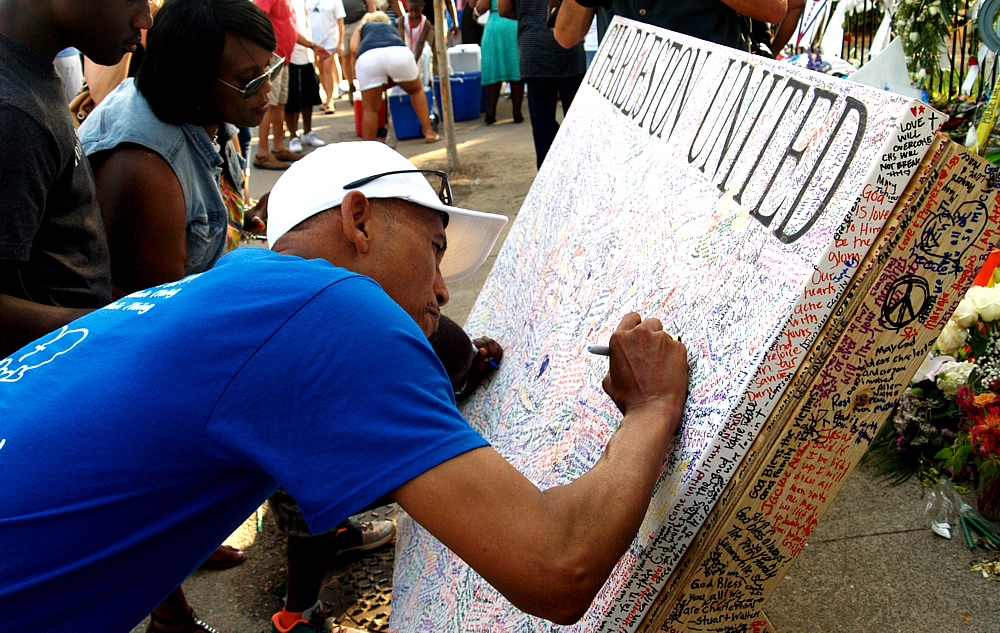
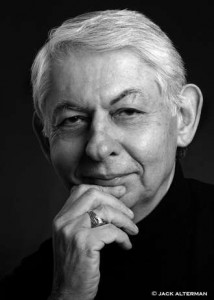
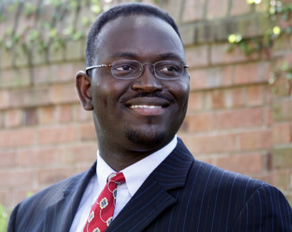
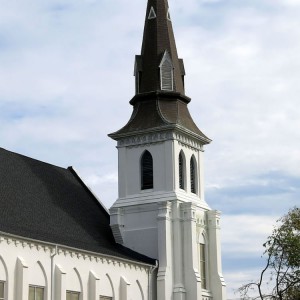

 We Can Do Better, South Carolina!
We Can Do Better, South Carolina!
























